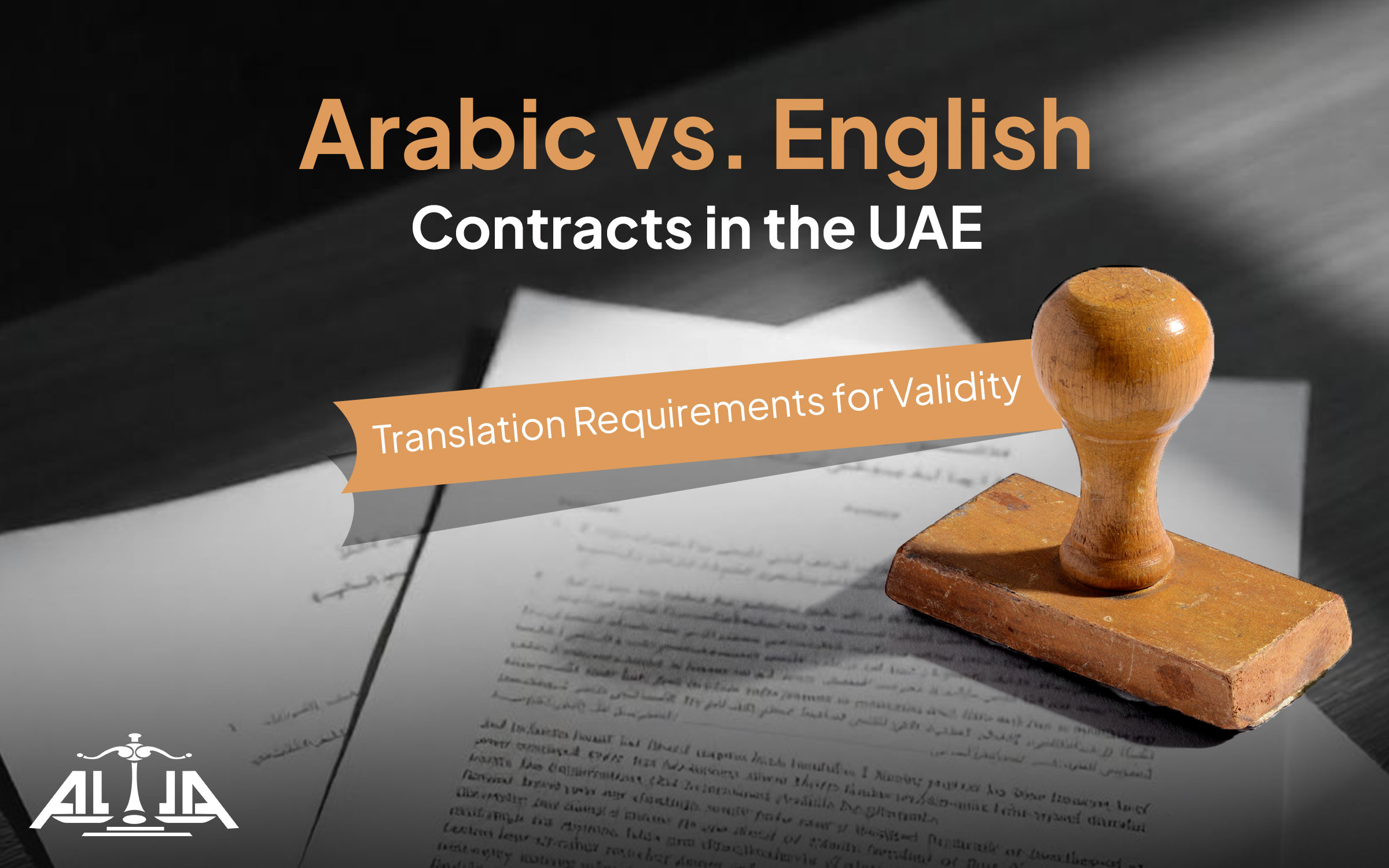UAE has a multicultural and multi-linguistic business landscape where professionals from all over the world come to run their businesses and advance their careers.
This often requires the translation of key business or legal documents into Arabic which is the official language of the UAE. This allows residents or stakeholders from diverse backgrounds to come up with accurate documents that are both accessible as well as enforceable.

For an accurate translation of such contracts, the translator must possess a deep understanding of the nuances between the Arabic language and its corresponding legal terminologies in other languages such as English.
This blog sheds some light on the translation requirements for Arabic vs English contract validity in the UAE. This information will enable you to create impeccable contracts that are not questionable in any way so keep on reading till the end.
- Arabic vs English: The Role of Language in UAE Contracts
- Arabic: The Official Language of the Region
- English Contracts
- Translation Requirements for the Legal Validity of the Contracts in the UAE
- Accurate Translation: A Requirement for Contract Validity and Enforcement
Arabic vs English: The Role of Language in UAE Contracts
The complexity of legal document translation in the UAE results from huge language differences as well as the difficulty of finding equivalents of legal concepts or principles in both English and Arabic languages.
Accurate legal translation is a must if a contract is to be valid and enforceable. Though in the UAE, the Arabic versions of the contracts are considered valid when a conflict arises, the English version is still very much important. This is because international stakeholders rely on these when doing negotiations or day-to-day business dealings.

This means both the English as well as Arabic contracts must be drafted and translated with extreme levels of precision as well as legal rigor to ensure the rights and obligations of every party involved in the contract are clear.
Arabic: The Official Language of the Region
Arabic is the official language of the UAE which means it is always the main language that is referred to for legal and government contracts. Every court and government entity recognizes Arabic as the primary language of contracts which means every contract must be in Arabic or it must be accompanied by an Arabic translation for it to be considered legally valid.
The UAE contract laws specify that if there are some inconsistencies between the English text and its Arabic translation, the Arabic version will always be given the main preference. This means every translated legal document must convey accurate legal nuances as well as the intentions of the corresponding contractual terms of the English language.
This warrants the involvement of professional legal advisory services for the translation who know both languages as well as legal systems very well. This leads to contracts that are both accurate and consistent in English as well as Arabic.
English Contracts
The English language is also used widely for contracts in the UAE owing to the region’s diverse business environment that welcomes expats as well as multinational companies from all over the globe.

This language is mostly used in contracts like
- Corporate agreements
- International trade deals
- Employment contracts,
- Other commercial arrangements
These contracts are valid or legally binding in the UAE if both parties agree to it. But in case when the contract is to be enforced through the UAE court system or some other government entity its Arabic version translated by expert Legal services is always given preference.
This means every English contract used in legal proceedings must also have an accurate legal translation if it is to be considered admissible.
Translation Requirements for the Legal Validity of the Contracts in the UAE
As the Arabic language is recognized officially in the UAE, contracts written in any other language must be translated with care following very specific rules. Following are certain translation requirements that every contract must fulfill to ensure legal validity in the UAE.

- Every contract involved in government or legal procedures must have a certified Arabic translation preferably done by reputable and recognized litigation services.
- In case of disputes, the Arabic version of the contract is always considered authoritative for legal interpretations.
- Both the English and Arabic versions of the contract must have precise and unambiguous languages.
- Business-related contracts submitted to entities like the Department of Economic Development (DED) or the Dubai Land Department must be available in both languages.
- In commercial or real estate agreements, you might be asked to submit both English and Arabic versions of the contract. In this case, however, the Arabic version is considered binding.
- In case the contract has an arbitration clause, the arbitration itself can take place in Arabic or English based on the rules of the arbitration center.
- In case, the arbitration takes place in an Arabic-speaking jurisdiction, the Arabic translation of the contract might still be required.
Accurate Translation: A Requirement for Contract Validity and Enforcement
UAE’s dynamic business landscape invites millions of expats to the region and that in turn leads to an enhanced need for accurate contract translation for a number of applications. The linguistic diversity in the region affects both the local as well as international business transactions making the contract enforcement quite challenging.
Accurate correct translation is not just about linguistics. It goes way beyond that where you have to be careful in your choice of legal terms and their connotations to ensure accurate interpretation as well as enforcement of the contract clauses.
This reduces discrepancies between English and Arabic versions which preserves the original intentions and the legal obligations of each party making the enforcement easier.
Moreover, the understanding and interpretation of legal terms might be different in Arabic as compared to well-established Anglo-American laws. This can lead to certain challenges in the interpretation of the contracts which are eliminated by correct contract translation.
The accurate translation can eliminate the divergence between legal concepts of the English and Arabic versions of the contracts which leads to much better dispute resolution as well as contract enforcement.
Conclusion
Though contracts in English language in the UAE are common and even enforceable in some cases, Arabic remains the authoritative language for such contracts particularly the ones that deal with legal or government matters.
Certified Arabic translation of every legal document is a must if it is to protect the legal rights of both parties equally and to remain fully valid. This translation must include legal terms that reflect the accurate contents of the same agreement in English or some other language.
This is the only way to ensure every contract’s enforceability as well as validity in the multilingual and diverse business culture of the UAE.
You can visit us at Alawi Al Jabri to get the best legal translation services for your legal, court, and official contracts from our expert and certified translators all over the UAE.

